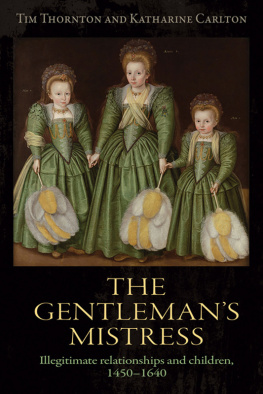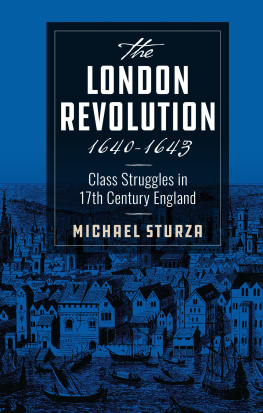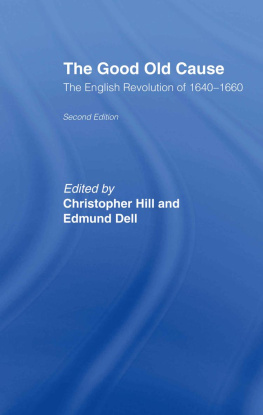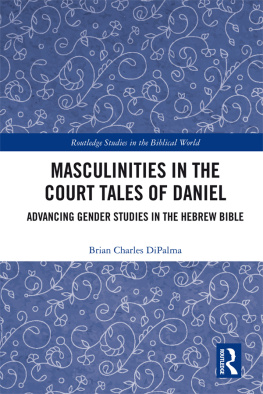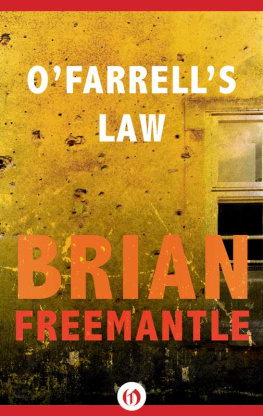SEMINAR STUDIES IN HISTORY
General Editor: Roger Lockyer
Charles I 16251640
Brian Quintrell
First published 1993 by Pearson Education Limited
Published 2013 by Routledge
2 Park Square, Milton Park, Abingdon, Oxon OX14 4RN
711 Third Avenue, New York, NY 10017, USA
Routledge is an imprint of the Taylor & Francis Group, an informa business
Copyright 1993, Taylor & Francis.
All rights reserved. No part of this book may be reprinted or reproduced or utilised in any form or by any electronic, mechanical, or other means, now known or hereafter invented, including photocopying and recording, or in any information storage or retrieval system, without permission in writing from the publishers.
Notices
Knowledge and best practice in this field are constantly changing. As new research and experience broaden our understanding, changes in research methods, professional practices, or medical treatment may become necessary.
Practitioners and researchers must always rely on their own experience and knowledge in evaluating and using any information, methods, compounds, or experiments described herein. In using such information or methods they should be mindful of their own safety and the safety of others, including parties for whom they have a professional responsibility.
To the fullest extent of the law, neither the Publisher nor the authors, contributors, or editors, assume any liability for any injury and/or damage to persons or property as a matter of products liability, negligence or otherwise, or from any use or operation of any methods, products, instructions, or ideas contained in the material herein.
ISBN 13: 978-0-582-00354-5 (pbk)
British Library Cataloguing in Publication Data
Quintrell, B.W.
Charles I, 162540. (Seminar Studies in History Series)
I. Title II. Series
941.06092
Library of Congress Cataloging-in-Publication Data
Quintrell, Brian.
Charles I, 16251640 / Brian Quintrell.
p. cm. (Seminar studies in history)
Includes bibliographical references and index.
ISBN 0-582-00354-7 : 4.75
1. Charles I, King of England, 16001649. 2. Great Britain Politics and government 16251649. I. Title. II. Series.
DA395.Q56 1991
941.062dc20
92-28086
CIP
Set in 10/11 point Baskerville (Linotron)
Contents
Introduction to the series
Under the editorship of a reputable historian, Seminar Studies in History covers major themes in British and European history. The authors are acknowledged experts in their field and the volumes are works of scholarship in their own right as well as providing a survey of current historical interpretations. They are constantly updated, to take account of the latest research.
Each title has a brief introduction or background to the subject, a substantial section of analysis, followed by an assessment, a documents section and a bibliography as a guide to further study. The documents enable the reader to see how historical judgements are reached and also to question and challenge them.
The material is carefully selected to give the advanced student sufficient confidence to handle different aspects of the theme as well as being enjoyable and interesting to read. In short, Seminar Studies offer clearly written, authoritative and stimulating introductions to important topics, bridging the gap between the general textbook and the specialized monograph.
Seminar Studies in History were the creation of Patrick Richardson, a gifted and original teacher who died tragically in an accident in 1979. The continuing vitality of the series is a tribute to his vision.
Roger Lockyer
The General Editor
Roger Lockyer, Emeritus Reader in History at the University of London, is the author of a number of books on Tudor and Stuart history including Buckingham, a political biography of George Villiers, first Duke of Buckingham, 15921628, and The Early Stuarts: A Political History of England 16031642. He has also written two widely used general surveys Tudor and Stuart Britain and Habsburg and Bourbon Europe.
We live, said William Laud, Bishop of St Davids, in his sermon at the opening of Charless first Parliament in June 1625, to see a miracle, change without alteration: another king, but the same life-expression of all the royal and religious virtues of his father; and no sinews shrinking in the State (, p. 171). But James had never seen his Court as an exemplar in this way; and it would be wrong to conclude that Jacobean England had been grievously illregulated or that a loosely ordered Court was necessarily an ineffectual one. Jamess Court was merely following the more relaxed style familiar in France and Scotland.
This qualification deserves emphasis, as prevailing fashions in English historiography, whether Whig or Marxist, have seldom been kind to James. So much is this so that the scathing comments of Sir Anthony Weldon, a minor courtier upset by his dismissal for insulting the Scots, for many years provided the popular image of James I and his Court, after being given new currency in the nineteenth century. Weldons more balanced final assessment of James has had less prominence ().
Instead, a number of historians, known collectively but not entirely accurately as revisionists (for they form no school and do not always accept the label), have, in pursuing shorter-term explanations of the Civil Wars origins, stressed the low-key nature of much of early modern government. They have established, for example, that relations between Crown and Parliament were by no means always combative, and that much was done, even in the Commons, in a cordial and cooperative way. Enjoyment of royal patronage, and the need to retain royal favour, almost invariably exercised a constraining influence. There was no sharp division between Court and country ().
From such historiographical debates, James emerges moderately well. His relations with his Parliaments were always patchy, and his efforts to increase his revenues were always likely to arouse fears about his subjects property; but particularly in his early years, his misunderstandings may often be traced to lack of accurate counsel from his ministers, who had their own axes to grind, and to the unhappy influence of his Bedchamber officers ().
Jamess financial position was, however, never secure. He hoped to overcome the weakness of his Elizabethan inheritance by taking advantage of the Exchequers apparently hopeful verdict in the case of the malcontent Turkey merchant John Bate in 1606 to create a solid annual source of ordinary revenue through an extension of the customs, beyond the limits set by statutory regulation of tonnage and poundage ().
This situation brought into sharper focus the delicate and ill-defined relationship between the granting of supply by the Commons and the remedying by the Crown of the grievances they put before it ().
In 1624, after Charless dramatic but fruitless dash with Buckingham to Madrid had at least exposed the hollowness of Spanish interest in bringing about the release even of the Lower Palatinate, on the Rhine, which had fallen to Spinolas troops in 1620, James himself first publicly proposed to Parliament that supply should be appropriated to specific defensive purposes, which might precede a war, and his ministers made accountable to the Commons for the way it was spent; but the Commons had toyed with this arrangement in 1621, and may well have suggested it to James in 1624 (). While there was no crude bargaining for redress of grievances before supply, of the kind Whig historians once assumed, Jamess experiences nevertheless demonstrated that there existed an intangible but powerful relationship between the two which it ill behove a king to ignore.





